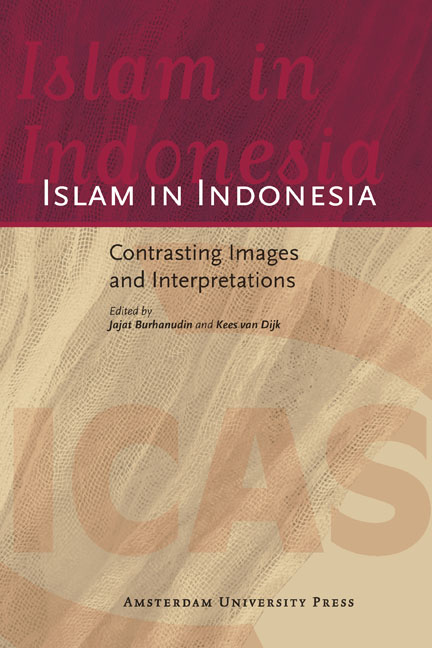Book contents
- Frontmatter
- Contents
- Introduction
- 1 Comparing Different streams of Islam: Wrestling with Words and Definitions
- 2 Defining Indonesian Islam: An Examination of the Construction of the National Islamic Identity of Traditionalist and Modernist Muslims
- 3 Indonesia in the Global Scheme of Islamic Things: Sustaining the Virtuous Circle of Education, Associations and Democracy
- 4 Distinguishing Indonesian Islam: Some Lessons to Learn
- 5 Islam, State and Society in Democratising Indonesia: A Historical Reflection
- 6 The Politics of Piety in the Pondok Pesantren Khusus Waria Al-Fattah Senin-Kamis Yogyakarta: Negotiating the Islamic Religious Embodiment
- 7 The Indonesian Muslim Feminist Reinterpretation of Inheritance
- 8 Managing Familial Issues: Unique Features of Legal Reform in Indonesia
- 9 A new Generation of Feminists within Traditional Islam: An Indonesian Exception
- 10 Religious Pluralism and Contested Religious Authority in Contemporary Indonesian Islam: A. Mustofa Bisri and Emha Ainun Nadjib
- 11 Islam and Humanitarian Affairs: The Middle Class and New Patterns of Social Activism
- 12 Dakwah radio in Surakarta: A Contest for Islamic Identity
- 13 Muslim Fundamentalism in Educational Institutions: A Case Study of Rohani Islam in High Schools in Cirebon
- 14 Majlis Tafsir Al-Qur’an and its Struggle for Islamic Reformism
- Glossary
- About the Editors and Contributors
- Bibliography
- Index
- Monographs
Introduction
Published online by Cambridge University Press: 09 January 2021
- Frontmatter
- Contents
- Introduction
- 1 Comparing Different streams of Islam: Wrestling with Words and Definitions
- 2 Defining Indonesian Islam: An Examination of the Construction of the National Islamic Identity of Traditionalist and Modernist Muslims
- 3 Indonesia in the Global Scheme of Islamic Things: Sustaining the Virtuous Circle of Education, Associations and Democracy
- 4 Distinguishing Indonesian Islam: Some Lessons to Learn
- 5 Islam, State and Society in Democratising Indonesia: A Historical Reflection
- 6 The Politics of Piety in the Pondok Pesantren Khusus Waria Al-Fattah Senin-Kamis Yogyakarta: Negotiating the Islamic Religious Embodiment
- 7 The Indonesian Muslim Feminist Reinterpretation of Inheritance
- 8 Managing Familial Issues: Unique Features of Legal Reform in Indonesia
- 9 A new Generation of Feminists within Traditional Islam: An Indonesian Exception
- 10 Religious Pluralism and Contested Religious Authority in Contemporary Indonesian Islam: A. Mustofa Bisri and Emha Ainun Nadjib
- 11 Islam and Humanitarian Affairs: The Middle Class and New Patterns of Social Activism
- 12 Dakwah radio in Surakarta: A Contest for Islamic Identity
- 13 Muslim Fundamentalism in Educational Institutions: A Case Study of Rohani Islam in High Schools in Cirebon
- 14 Majlis Tafsir Al-Qur’an and its Struggle for Islamic Reformism
- Glossary
- About the Editors and Contributors
- Bibliography
- Index
- Monographs
Summary
In recent years, the way Islam manifests itself in Indonesia has changed. As elsewhere in the Muslim world, there is stricter adherence to Islam, and fundamentalism has gained strength. An increasing number of Indonesian Muslims are observing the tenets of their religion more faithfully. More people fulfil the hajj, one of the basic pillars of Islam, and an increasing number of women wear a headscarf, sometimes a very fashionable one. These women include members of a segment of society that used to be considered the embodiment of secularism and syncretism, known in Indonesia as the abangan.
National surveys confirm this trend. In the last ten years or so, Muslims in Indonesia have become more religious in their attitudes and practices. The use of rituals associated with abangan culture has decreased, to be replaced by those of more observant Muslims, the santri. As a result, Islamic symbols and elements can be seen everywhere in Indonesian public life, including in liberal and capitalist institutions such as company offices and shopping malls.
The increasing emphasis on Islam is also reflected in the shifting position of fundamentalist groups. Since Suharto was forced to step down in the late 1990s, Indonesia has witnessed a growing religious militancy. Not only have the militants increased in number, but they are also more actively engaged in missionary activities among fellow Muslims. Various radical organisations have emerged, including the FPI (Front Pembela Islam, Front of the Defenders of Islam), the MMI (Majelis Mujahidin Indonesia, Indonesian Council of Jihad Fighters) and the Laskar Jihad (Jihad Force). With a militant agenda of purifying Islam, these organisations are engaged in a series of violent acts against others, creating concern among moderate Muslims, who still form a majority in Indonesia. Their aspiration is to implement Islamic law in the public sphere, which in Indonesia is supposed to be religiously neutral.
The aims of these radical Muslim organisations are congruent with those of a number of Islamic political parties in parliament, while in some regions local administrations are trying to enforce proper Islamic conduct. The fatwa-giving commission of the MUI (Majelis Ulama Indonesia, Council of Indonesian Religious Scholars) – the institution entrusted by the government with this task – and its regional chapters, at times also acts as the guardian of a strict interpretation of Islam.
- Type
- Chapter
- Information
- Islam in IndonesiaContrasting Images and Interpretations, pp. 7 - 14Publisher: Amsterdam University PressPrint publication year: 2013

